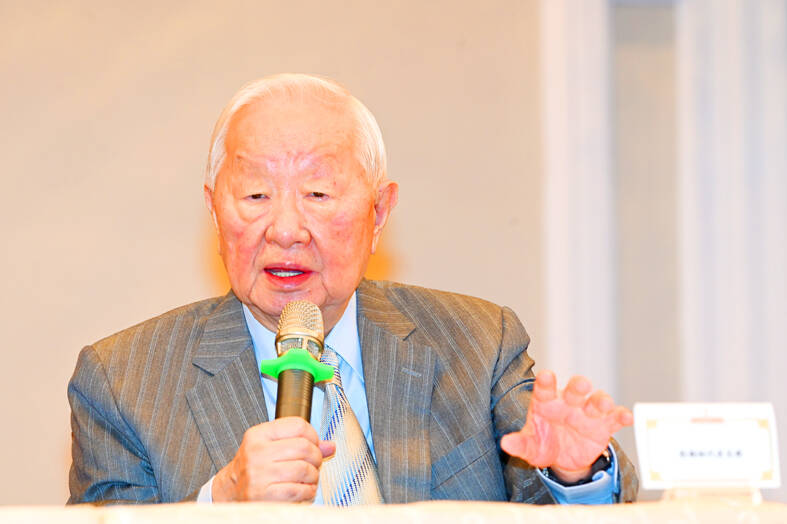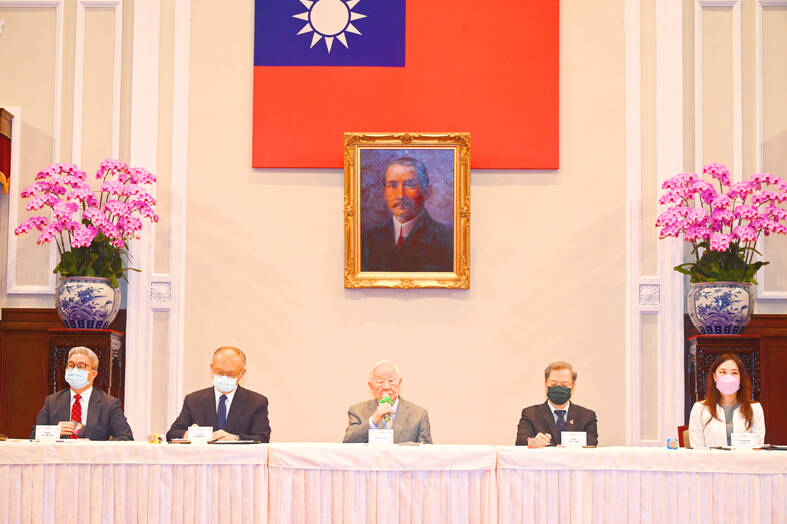Taiwan Semiconductor Manufacturing Co (TSMC, 台積電) founder Morris Chang (張忠謀) yesterday confirmed that the company plans to produce its most advanced 3-nanometer chips in the US as part of the company’s phase 2 plan at its plant in Phoenix, Arizona.
The 91-year-old entrepreneur, who has been appointed as Taiwan’s envoy to APEC six times, yesterday morning held a news conference at the Presidential Office Building to discuss his delegation’s accomplishments at this year’s APEC Economic Leaders’ Week in Bangkok, which ended on Saturday.
He was asked whether TSMC has plans to build advanced chips in the US.

Photo: Tien Yu-hua, Taipei Times
“TSMC’s plant in Arizona is to produce 5-nanometer chips, which comprise the most advanced chip design in the US now, but the company is able to produce 3-nanometer chips, which is its newest technology,” Chang said.
Asked whether TSMC plans to produce 3-nanometer chips in the US, Chang said: “Yes, after it begins producing 5-nanometer chips.”
“The phase 1 plan at the Phoenix plant is to manufacture 5-nanometer chips and the production of 3-nanometer chips would be in phase 2,” he added.

Photo: Tien Yu-hua, Taipei Times
Chang said that he and his wife plan to attend a ceremony in Phoenix on Dec. 6 to launch chip manufacturing at the plant, adding that US President Joe Biden and US Secretary of Commerce Gina Marie Raimondo have been invited to the ceremony.
“We are not sure if President Biden will attend, but the secretary is scheduled to attend the ceremony in Phoenix,” he said.
Representatives from the company’s customers and suppliers, along with US lawmakers, would also be present, Chang said.
Chang was also asked about Dutch chipmaker ASML Holding NV’s plan to operate a semiconductor machinery plant in New Taipei City, and whether it constitutes an example of global diversification in chip production.
“Many countries have only begun to realize that chips are essential products, and envy and admire Taiwan for having such products and technology. During the APEC forum, I was approached by quite a few representatives inquiring about whether TSMC could produce chips in their countries,” Chang said.
He did not say which countries made the inquiries, saying only that “it is impossible for TSMC to have chip production plants in so many different places.”
Reporters also asked Chang about his encounter with Chinese President Xi Jingping (習近平) in Bangkok, where he reportedly congratulated Xi for securing a third term at the Chinese Communist Party’s 20th National Party Congress.
Chang said it was his personal comment and he did not discuss it with the Presidential Office prior to his meeting with Xi.
“The only instruction from the Presidential Office was that I do not have to avoid meeting him [Xi] or greeting him if the opportunity presents itself. As to congratulating President Xi for his achievement at the National Party Congress, that was just my own sentiment,” he said.
National Security Council Deputy Secretary-General Hsu Szu-chien (徐斯儉) said President Tsai Ing-wen (蔡英文) respects the way that Chang chose to interact with Xi.

CHAOS: Iranians took to the streets playing celebratory music after reports of Khamenei’s death on Saturday, while mourners also gathered in Tehran yesterday Iranian Supreme Leader Ayatollah Ali Khamenei was killed in a major attack on Iran launched by Israel and the US, throwing the future of the Islamic republic into doubt and raising the risk of regional instability. Iranian state television and the state-run IRNA news agency announced the 86-year-old’s death early yesterday. US President Donald Trump said it gave Iranians their “greatest chance” to “take back” their country. The announcements came after a joint US and Israeli aerial bombardment that targeted Iranian military and governmental sites. Trump said the “heavy and pinpoint bombing” would continue through the week or as long

TRUST: The KMT said it respected the US’ timing and considerations, and hoped it would continue to honor its commitments to helping Taiwan bolster its defenses and deterrence US President Donald Trump is delaying a multibillion-dollar arms sale to Taiwan to ensure his visit to Beijing is successful, a New York Times report said. The weapons sales package has stalled in the US Department of State, the report said, citing US officials it did not identify. The White House has told agencies not to push forward ahead of Trump’s meeting with Chinese President Xi Jinping (習近平), it said. The two last month held a phone call to discuss trade and geopolitical flashpoints ahead of the summit. Xi raised the Taiwan issue and urged the US to handle arms sales to

State-run CPC Corp, Taiwan (CPC, 台灣中油) yesterday said that it had confirmed on Saturday night with its liquefied natural gas (LNG) and crude oil suppliers that shipments are proceeding as scheduled and that domestic supplies remain unaffected. The CPC yesterday announced the gasoline and diesel prices will rise by NT$0.2 and NT$0.4 per liter, respectively, starting Monday, citing Middle East tensions and blizzards in the eastern United States. CPC also iterated it has been reducing the proportion of crude oil imports from the Middle East and diversifying its supply sources in the past few years in response to geopolitical risks, expanding

Pro-democracy media tycoon Jimmy Lai’s (黎智英) fraud conviction and prison sentence were yesterday overturned by a Hong Kong court, in a surprise legal decision that comes soon after Lai was jailed for 20 years on a separate national security charge. Judges Jeremy Poon (潘兆初), Anthea Pang (彭寶琴) and Derek Pang (彭偉昌) said in the judgement that they allowed the appeal from Lai, and another defendant in the case, to proceed, as a lower court judge had “erred.” “The Court of Appeal gave them leave to appeal against their conviction, allowed their appeals, quashed the convictions and set aside the sentences,” the judges